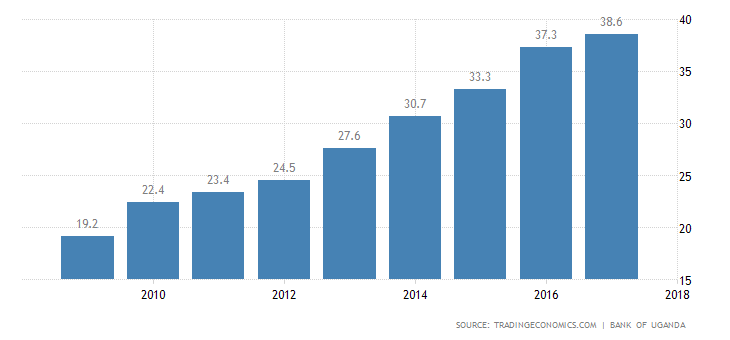Uganda Public Debt to GDP ratio to rise to 49.5 percent, says IMF
Wednesday February 13 2019
By MARTIN LUTHER OKETCH

In Summary
- According to data from the Central Bank, while lending rates on foreign exchange loans stood at an average of 8.2 per cent in quarter ended December 2018, the shilling-denominated loans averaged at 20.3 remaining high prohibiting growth in private sector credit.
The International Monetary Fund (IMF) yesterday said the ratio of Uganda’s public debt to the GDP will rise to 49.5 per cent by the 2021/22 financial year because of continued large fiscal expenditure by government.
The
IMF said over the past five years, Uganda’s budget on repayments has been
increasing exponentially, due to growth in the level of public expenditure.
Currently Uganda’s total public debt stock (domestic and external) amounts to
$10.7b (Shs41.326 trillion), translating to a ratio of 41.5 per cent.
Speaking a press briefing in Kampala yesterday, Dr Axel Schimmelpfenning, the
IMF division chief African department, said public debt will continue to grow
in the next two years and is expected to hit 49.5 per cent of the GDP.
“It
is very important to plot a debt curve. We have to invest in the people and
infrastructure [while] at the same time, you need both but you need to feed in
the resources that you have,” he said.
Going forward, Dr Schimmelpfenning said, government must adopt a debt ceiling
strategy through nominal terms as opposed to the net present value and it
should be at 50 per cent of the GDP.
Last
week, during the Bank of Uganda policy rate meeting, the Central Bank said
rising debt was a threat to inflationary pressure and a risk to the currently
growth.
However, government has persistently indicated that the current rate does not
pose any threat to the economy. Uganda, according to the IMF will in the
2018/19 financial year grow at 6.3 per cent and this will be maintained through
out to the 2020/21 financial year.
However,
Dr Schimmelpfenning said the growth must be inclusive and create at least
create 600,000 job annually for the rate to stand.
Finance minister Matia Kasaija, yesterday said that Uganda’s economy was poised
to continue growing because of positive economic fundamentals.
However, he said the economy was still shaking off some bottleneck such the
cost of borrowing.
This, he said, was “still very high,” thus blocking the growth in private
sector credit.
